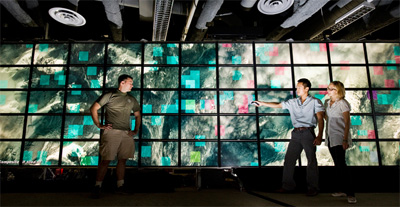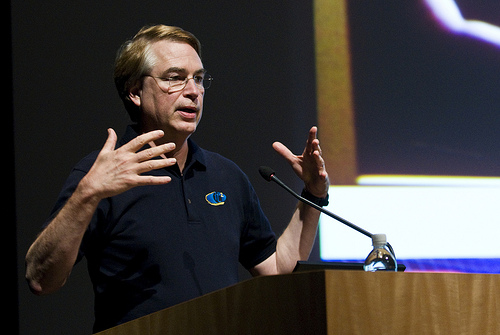Calit2 and UC San Diego Researchers Participate in AAAS 2010
San Diego, Feb. 11, 2010 -- Advancing the metagenomics revolution, the future of stem cell research, understanding genome instability in cancer cells, and how computer science is being used to solve the nation’s most pressing health and environmental “grand challenges” are just a few of the topics that more than 20 UC San Diego researchers will discuss Feb. 18-22 at the annual meeting of the American Association for the Advancement of Science (AAAS) at the San Diego Convention Center.
|
The AAAS meeting, America’s largest annual general scientific conference, is expected to draw as many as 8,000 attendees from 50 countries. The theme of this year’s meeting is bridging science and society, and will emphasize how the research of scientists and engineers is leading to improved medical treatments, better understanding of climate change, and technological advances that are improving the quality of life for humankind.
“UC San Diego’s unique environment encourages collaborative research across traditional academic departments, and it is at these intersections of disciplines where many new breakthroughs are being made,” said UC San Diego Chancellor Marye Anne Fox, co-chair of this year’s meeting with Qualcomm founder Irwin Jacobs. “At this important scientific conference, our researchers will explain how they’ve been able to translate their discoveries into real-world applications that improve society.”
|
On Feb. 22, Smarr will return to the podium for a talk on "Science and Cyberinfrastructure in the Data-Dominated Era". His talk is part of a panel looking back at the 25 years since the National Science Foundation launched its supercomputer center program in February 1985. "The 25 years of innovation in information infrastructure and scientific simulation that NSF has funded has steadily pushed out the frontier of knowledge while transforming our society and economy," says Smarr. "I will show how two NSF-funded grand challenges, one in basic scientific research (cosmological evolution) and one in computer science (super-high-bandwidth optical networks) are interweaving to enable new modes of discovery." (Other speakers on the panel moderated by NSF's Edward Seidel are Chris Johnson of the University of Utah and Thomas Jordan of USC.)
Another session of interest to the Calit2 community will be "What's Next for the Net? The Internet of Things and Ubiquitous Computing" on Feb. 19. Calit2 UCSD division director Ramesh Rao will moderate the panel, which includes Qualcomm founder Irwin Jacobs, KC Claffy of the San Diego Supercomputer Center, and Lee Rainie from the Pew Internet and American Life Project. This panel will examine the technological advances that are enabling the “Internet of Things” and the “Smarter Planet,” including low-power sensors, radio-frequency identification tags, and ubiquitous wireless networks. In addition, panelists will discuss the challenges involved in expanding the Internet by a factor of 100 or more and examine the barriers that could slow the deployment of such technologies at sensor nets and geo-location devices (e.g., privacy).
A full schedule of talks, workshops, tours and news involving UC San Diego researchers at the conference can be found at http://research.ucsd.edu/aaasfeb2010/timeline.html.
About 50 journalists attending the AAAS meeting are also participating in a tour on Feb. 17 of research laboratories at UC San Diego and the nearby Salk Institute for Biological Studies. The lab tours for working journalists will include a stop at Calit2 for demos and presentations under the theme "Visualizing Science." The panel will be moderated by Calit2 director Larry Smarr, with short presentations on:
- Visual Analytics 2.0 for Science: Prof. Falko Kuester, Calit2 Professor of Visualization and Virtual Reality, will talk about the revolution in collaborative analytical tools that are transforming research in a wide range of data-intensive fields;
- Project GreenLight: Prof. Tom DeFanti, Calit2 Research Scientist and Principal Investigator on the $2.6 million NSF GreenLight grant, will talk about UCSD's effort to build a controlled environment to test and ultimately improve the energy efficiency of IT, which has a similar carbon "footprint" as the airline industry;
- Computational Astrophysics Data Center (CADAC): Prof. Mike Norman, Interim Director of the San Diego Supercomputer Center, will talk about CADAC, a free service for the astrophysics community that hosts a public data collection of large astrophysical simulations and provides data-analysis resources to researchers worldwide; and
- Large-Scale Structural Testing and Modeling: Prof. Benson Shing from the Jacobs School of Engineering's Structural Engineering department, will talk about modeling stress and other phenomena in large structures.
For more information, go to http://research.ucsd.edu/aaasfeb2010/timeline.html.
Related Links
UCSD Timeline at AAAS 2010
AAAS 2010
Media Contacts
Rex Graham, 858-534-5952 or ragraham@ucsd.edu and Doug Ramsey, 858-822-5825, dramsey@ucsd.edu.



